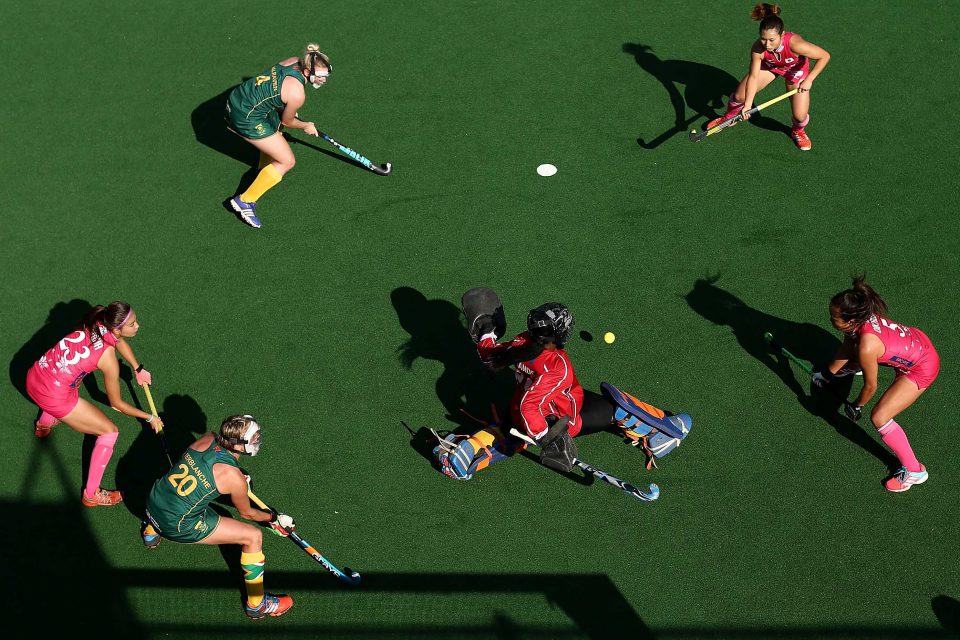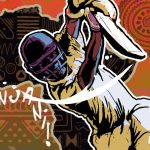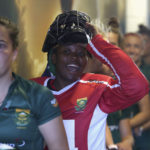The awakening of Phumelela Mbande
The 26-year-old chartered accountant and hockey goalkeeper has successfully balanced sport and her studies, in addition to making an impact as an athlete activist.
Author:
12 August 2019

Phumelela Mbande, the South African women’s hockey vice-captain and goalkeeper, never thought of herself as politically conscious. Raised in a Christian home by conservative parents, she was encouraged to keep out of trouble. She lived the first 23 years of her life devoted to her sport and to fulfilling her dream of becoming a chartered accountant. She had a solid group of friends, enjoyed her studies and mostly traversed an ordinary path.
Today, the 26-year-old is one of South Africa’s most inspiring athletes. As a founding member of Players for Transformation (PFT), a quasi-union of black hockey players, she has become a champion of athlete activism in a nation sorely lacking in firebrands willing to use the platform afforded by sport to change the world around them.
In November last year, the PFT opened a Twitter account and declared: “The South African Hockey Association [Saha] has FAILED players of colour.” To this day, it remains the most public demonstration by active athletes in a national sports team demanding an accelerated rate of racial inclusivity.
Related article:
That change is yet to materialise. White men coach the senior men’s and women’s indoor teams, the senior men’s and women’s outdoor teams, and the men’s outdoor Under-21 team. And the majority of the players within these teams don’t truly reflect the country’s demographics.
But because of the PFT and the noise it has made, Saha has promised to address this ongoing disparity. Dialogue has intensified. Promises have been made. Previously marginalised players have become emboldened to speak out against the injustices they face and there is hope that similar movements might take root in other sports.
Mbande’s transformation
To think it all started with a young woman who once completely disregarded the struggle for transformation.
“I thought that people who spoke about such things were looking for handouts and were just being lazy,” said Mbande. “If I saw something like that on social media, I would avoid it. I thought hard work was enough to take you where you wanted to go. I’m actually ashamed to think of how my mind used to work.”
Mbande likened her own transformation to an awakening. She was blind but now she can see. “And I can’t unsee the way things really are,” she explained. “Now that my eyes are open, I see now how much things still need to change.”
She blinked into consciousness on 22 February 2016. She was in a lecture at the University of Pretoria (Tuks) – where she was on a dual hockey and academic bursary, and completing a chartered accountancy honours programme – when a group of protesters burst through the doors chanting “One Language!” and “Afrikaans must fall!”.
Related article:
Tensions were high on campus as the use of Afrikaans as a medium of education had seen debates become shouting contests and shouting contests spill over into violent outbursts. Students were divided along racial lines. Leading the two respective groups were the EFF and AfriForum, populist organisations that know which buttons to push and how to galvanise sympathetic supporters.
Ordinarily, Mbande would have just rolled her eyes at such a disruption. “The year before, I wasn’t really interested in the Fees Must Fall protests,” she said. “I thought they were mostly looking to disrupt exams and I didn’t get why there was an issue.”
This time, something was different. Mbande is not religious, at least not in the way her devout mother would like, but she does believe in a higher power. Whether it was a benevolent force or fate or just plain curiosity, Mbande found herself caught in the current as she was swept along with the mass of bodies chanting and dancing their way across the university’s grounds.
Soon she was on a bus, heading for the centre of town, where leaders of the EFF youth wing were awaiting the outcome of a bail hearing after their arrest the previous week. “I couldn’t believe where I was,” Mbande said. “I called my mother and she freaked and told me to go home. But it was a vibe and I had to get a better sense of what was going on.”
Black and white clashes at Tuks
After making her presence felt, she returned to campus with a cluster of fellow students and a private security detail following them like vultures. She turned a corner and came face to face with a chain-link of muscle and angry stares. A few metres ahead was a group of mostly white, burly men blocking the way. “They had made this wall and it was the most intimidating thing I’d ever seen,” Mbande said.
Mbande is adamant that the first punch came from the other side. Conflicting reports at the time suggest otherwise. Though she wasn’t physically touched herself, the sudden explosion of violence shook her. She failed to keep hold of her emotions and was soon sitting alone, sobbing hysterically.
“I was so scared,” she recalled. “All hell broke loose. I was screaming. It didn’t make sense.”
Related article:
Amid the chaos, Mbande noticed that security guards were chasing exclusively black students while white students – “and their fathers”, as she described them – were left largely untouched. Reports from both sides offer differing accounts and the truth, the whole truth, likely lies in the middle. However, the source of Mbande’s next shock cannot be disputed.
“I saw my best friend, who is a white girl, standing with the AfriForum people. She asked me, ‘What the hell are you doing here?’ She then ignored me for the rest of the day. Later, on a group WhatsApp chat, she said something like, ‘Phums, you must admit that us white people really got you guys properly.’ She was boasting. That was the biggest concern to me.”
Trying to find herself
Over the next three weeks, which Mbande described as the most difficult of her life, she had a crisis of identity. Born in Mthatha, she spent most of her youth in Pietermaritzburg, where her black skin put her in the minority at school.
She was often teased as being “the black girl who acted like she was white”, as she described it, and would rebuke comments that suggested she was being duped into believing a racial harmony existed.
Now, she has seen her country for what it is: still fractured, still in need of healing, still with much growth to go through. “I felt like my whole life was a lie,” she said. “My brothers and I blamed my mother for raising us in a false world. She wasn’t honest with us. I had to see the reality for myself.”
Related article:
Mbande recalled a time during primary school when she forced herself to love the pop-punk of Avril Lavigne just so she could fit in with her mostly white schoolmates. She actively tried to assimilate, even if she didn’t realise it at the time. “I was told it didn’t matter that I was black,” she said. “In the aftermath of what happened on campus, those memories haunted me.”
Mbande sought therapy to better understand what she was going through. Her depression soon turned to anger, which was unleashed on social media. “I am the black girl who has grown up loving white people,” she posted on Facebook. “But my understanding of the world [has] changed.”
Her digital activism was relentless. Friends and family members were concerned by the sudden outpouring of posts covering the Black Lives Matter and Fees Must Fall movements. One former teacher unfriended her on Facebook. “She said she was sad to see what I was going through,” Mbande said. “She said it was an angry phase.”
Inspired by Colin Kaepernick
But this “phase” did not dissipate like her love for angsty Canadian pop-punk. Mbande stayed woke and was soon challenging her teammates and coaches. She called out casual racism that had for too long gone unremarked upon. A particular team-building dinner stands out, in which Mbande was made to feel like an antagonist for taking issue with the way a white colleague used different tones and words when speaking to waiters of different races.
Inspired by American footballer Colin Kaepernick, who knelt during the United States anthem before games in protest against police brutality, Mbande decided to use her standing to espouse social change. At first, she focused on mental health and teamed up with renowned sports psychologist Kirsten van Heerden, becoming an ambassador for the Girls Only Project, a Durban-based initiative that helps professional athletes with the unique stresses of performing at the elite level.
But this was not enough. Mbande wanted to make a bigger impact. In August last year, she was sitting in a hotel room with several other black hockey players during the Premier Hockey League, a franchise tournament for men and women in South Africa, when the issue of a transformation was raised.
Related article:
“I’d been speaking so long about these issues and knew I had to do something,” Mbande said. “I knew from that moment that I would try and make a real difference.”
One of the giants of athlete activism is American sociologist Harry Edwards. At 76, he is still an imposing figure. His deep voice, dark sunglasses and permanent black attire make him come across as a militant philosopher.
The author of The Revolt of the Black Athlete, Edwards was the architect of the Olympic Project for Human Rights that encouraged Tommie Smith and John Carlos to raise their fists on the podium of the 1968 Games in Mexico City. In the intervening years, Edwards has served as a mentor for athlete activists in the US, including Kaepernick, who stand and kneel at the crossroads of sports and politics. He once wrote, “We must teach our children to dream with their eyes open.”
What would he make of Mbande, whose eyes were opened two years ago and who now dreams of a more inclusive society? No doubt he would be impressed. She is impressive. At 26, she is setting an example to the rest of South Africa’s athletes.





